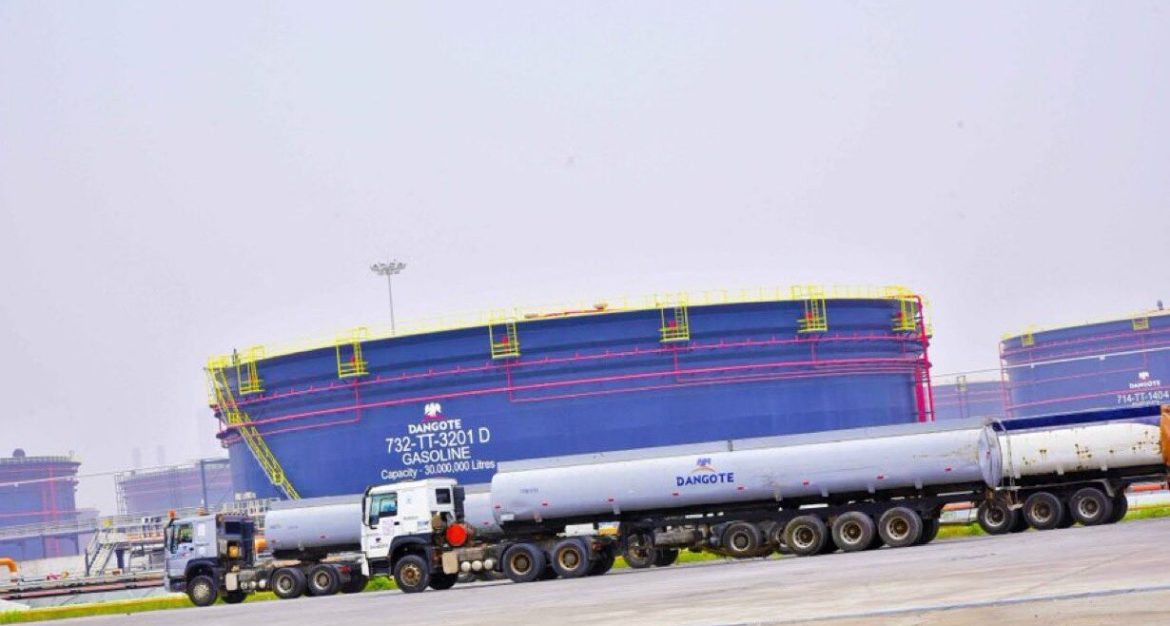The Dangote Petroleum Refinery has announced a major step aimed at changing how petrol and diesel are distributed across Nigeria. In a bold move, the company has revealed plans to absorb over N1.07 trillion annually in fuel distribution costs, a decision that is expected to benefit millions of Nigerians, especially businesses and filling stations operating across the country.
According to a statement issued by the refinery on Sunday, the company said it has already invested over N720 billion in acquiring 4,000 Compressed Natural Gas (CNG)-powered trucks that will be used for the delivery of refined petroleum products directly to marketers, industrial consumers, and other bulk users nationwide. The aim, according to Dangote Group, is to reduce the burden of high transportation costs, lower fuel prices, and ultimately bring down inflation, which has remained a major concern for Nigerians.
The direct-to-marketer fuel distribution model, which will officially begin on August 15, will cover delivery of Premium Motor Spirit (PMS), commonly known as petrol, diesel, and aviation fuel to various parts of the country. Dangote Refinery disclosed that it will supply 45 million litres of petrol, 15 million litres of diesel, and 5 million litres of aviation fuel daily to meet the national consumption figure of 65 million litres per day.
The company explained that with the average logistics cost per litre of fuel currently pegged at about N45, the refinery will be saving marketers and consumers across the country over N1.07 trillion in distribution costs annually. It added that this initiative would not only reduce fuel prices at the pump but also ease the financial burden on over 42 million Micro, Small and Medium Enterprises (MSMEs) operating in different parts of Nigeria.
According to the statement, “This bold step will see the privately-owned refinery absorb over N1.07 trillion annually in fuel distribution costs. The initiative is also poised to significantly benefit over 42 million Micro, Small and Medium Enterprises by reducing energy costs and enhancing profitability.”
The statement also revealed that the company is building a network of ‘mother and daughter’ CNG stations across the country as part of the infrastructure needed to implement the initiative. This is expected to improve energy efficiency, reduce Nigeria’s dependency on diesel-powered transportation, and promote environmental sustainability.
The Dangote Group, owned by Alhaji Aliko Dangote, Africa’s richest man, described the initiative as part of a broader commitment to tackling logistics bottlenecks that have plagued Nigeria’s petroleum distribution system for years. The new delivery system is expected to reduce production costs for manufacturers, ease inflation pressures for consumers, and create a more competitive market for petroleum products.
The company stated that more than 15,000 direct jobs will be created across the logistics chain. This includes positions for truck drivers, CNG station managers, and attendants who will work at the various distribution points nationwide. “The initiative is also expected to resuscitate dormant filling stations, fostering job creation in the process,” the company noted.
Dangote Refinery further stressed that the plan will also help reduce cross-border smuggling of petroleum products, which has become a growing concern since the removal of fuel subsidy last year. By making distribution more efficient and transparent, the company believes it can help curb diversion of products and ensure more fuel is available for Nigerians.
Since becoming operational in 2023, the Dangote Refinery, located in the Lekki Free Trade Zone in Lagos State, has been at the centre of Nigeria’s efforts to reduce dependence on imported petroleum products. The $20 billion facility is the largest refinery in Africa and is seen as a game-changer in Nigeria’s oil and gas industry.
Industry stakeholders have welcomed the new distribution initiative, saying it will help stabilise the fuel market, especially during periods of supply disruption or when global oil prices rise. They believe that if implemented effectively, it could also encourage other private operators to adopt similar models, making the entire fuel distribution process more reliable and less prone to corruption and inefficiency.
Economists and business analysts have described the move as a potential turning point for the Nigerian economy, especially as it aligns with government efforts to ease the cost of doing business. Reducing energy and logistics costs, they argue, will increase the competitiveness of local businesses and industries, boost productivity, and support efforts to attract investment.
The decision to use CNG-powered trucks is also being praised for its environmental benefits. Experts say it reflects a forward-thinking approach, especially at a time when global conversations around clean energy, climate change, and sustainable development are gaining more attention. Nigeria, as a member of various international climate agreements, has pledged to reduce emissions and adopt greener technologies. This initiative is expected to contribute towards achieving those goals.
As Nigerians continue to battle with the effects of inflation, high transportation costs, and limited access to affordable energy, the Dangote Refinery’s direct-to-marketer distribution system may provide some much-needed relief. While challenges remain, including infrastructure and policy consistency, many believe this initiative could mark a positive shift in how petroleum products are distributed in Nigeria.
